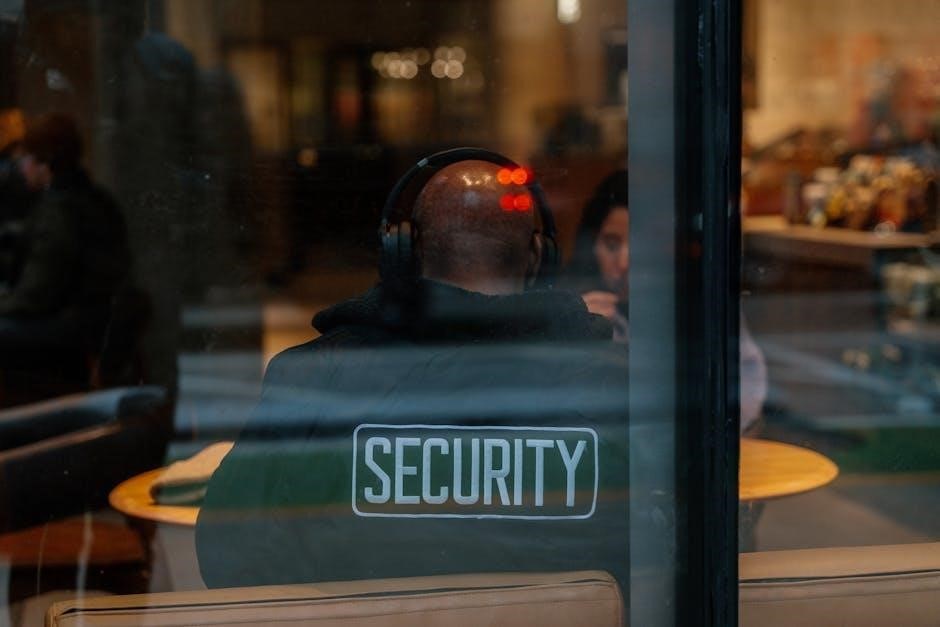A security guard plays a crucial role in safeguarding property, personnel, and assets by patrolling premises, monitoring equipment, and responding to emergencies․ Their duties ensure safety, prevent hazards, and maintain order․
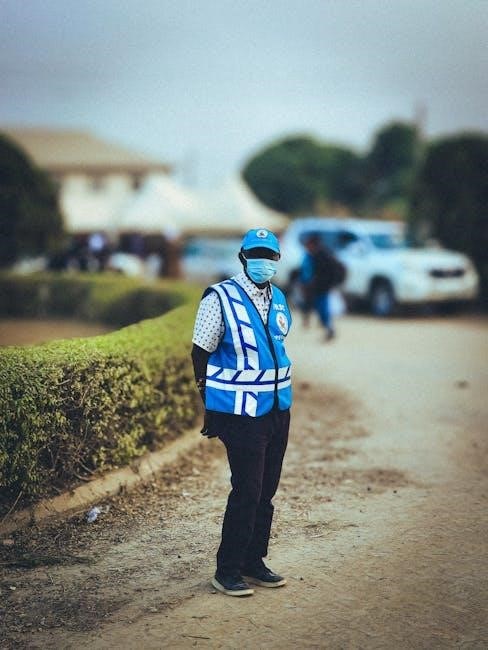
1․1 Overview of the Role of a Security Guard
A security guard is responsible for ensuring the safety and security of people, property, and assets․ Their primary duties include patrolling premises, monitoring surveillance equipment, and responding to emergencies․ Security guards act as a visible deterrent to potential threats, such as theft or vandalism, and are often the first point of contact for visitors or employees․ They must remain vigilant, observing and reporting any suspicious activities to prevent incidents․ Additionally, they enforce rules and regulations, manage access control, and collaborate with law enforcement when necessary․ Their role requires professionalism, attention to detail, and the ability to interact with the public in a courteous manner․ By maintaining a secure environment, security guards play a critical role in protecting lives and property, making them indispensable in various settings, from commercial buildings to public spaces․
1․2 Importance of Understanding Responsibilities
Understanding the responsibilities of a security guard is essential for maintaining a safe and secure environment․ Clear knowledge of their duties ensures effective patrol monitoring, incident response, and compliance with laws․ This understanding prevents hazards, protects assets, and upholds professionalism, making security guards indispensable in safeguarding premises and personnel․
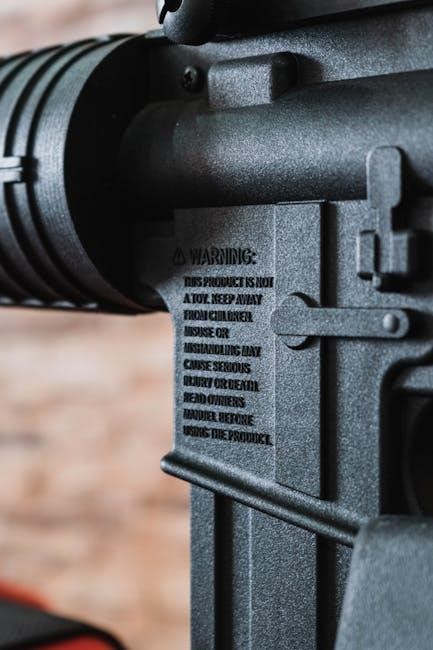
Key Responsibilities of a Security Guard
A security guard’s primary duties include patrolling premises, monitoring surveillance, inspecting buildings, managing access, responding to emergencies, communicating incidents, ensuring compliance, collaborating with law enforcement, and maintaining professional interactions and records․
2․1 Patrolling and Monitoring Premises
Patrolling and monitoring premises are fundamental duties of a security guard, ensuring the safety and security of the property, personnel, and assets․ Regular patrols help detect potential threats, such as unauthorized access, theft, or vandalism, allowing guards to address issues promptly․ Monitoring involves observing surveillance equipment, like CCTV cameras, to identify suspicious activities in real-time․ Guards must also inspect buildings, access points, and equipment to ensure they are secure and functioning properly․ This proactive approach prevents incidents before they escalate․ By maintaining visibility and vigilance, security guards deter criminal behavior and create a safe environment․ Their patrols also help identify safety hazards, such as fire risks or structural issues, which can be corrected to prevent accidents․ Effective patrolling and monitoring require attention to detail, strong observational skills, and the ability to respond quickly to emergencies, making it a critical component of their responsibilities․
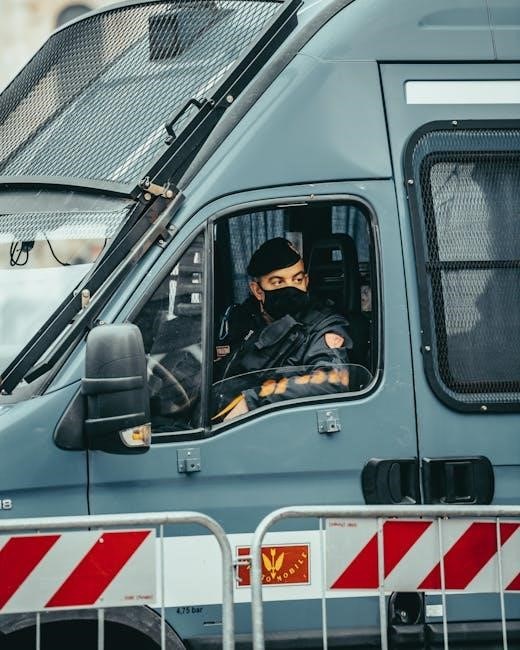
2․2 Operating Surveillance Equipment
Operating surveillance equipment is a critical responsibility of security guards, enabling them to monitor premises effectively and detect potential threats․ This includes managing CCTV cameras, alarms, and other security systems to ensure continuous observation of the property․ Guards must be trained to use this equipment proficiently, recognizing suspicious activities and responding appropriately․ Regular checks are necessary to maintain the functionality of surveillance devices, ensuring they operate without faults․ Monitoring real-time feeds allows guards to identify unauthorized access, theft, or vandalism promptly․ They must also handle alarm activations, investigating causes and taking necessary actions․ Accurate documentation of surveillance findings is essential for incident reporting and future reference․ Collaboration with other security personnel ensures a coordinated response to threats․ Proficiency in surveillance equipment operation enhances the overall safety and security of the premises, making it a vital skill for security guards in fulfilling their duties effectively;
2․3 Inspecting Buildings and Access Points
Inspecting buildings and access points is a fundamental duty of security guards to ensure the premises remain secure and free from potential risks․ This involves conducting regular patrols to identify and address safety hazards, such as unlocked doors, damaged fences, or malfunctioning alarms․ Guards must thoroughly check all entry and exit points, including gates, windows, and doors, to prevent unauthorized access․ They also verify that all access control systems, such as keycard readers or biometric scanners, are functioning properly․ Additionally, security personnel inspect equipment like locks, barriers, and surveillance cameras to ensure they are in good working condition․ Any discrepancies or vulnerabilities discovered during inspections are documented and reported to the appropriate authorities for immediate resolution․ These inspections play a critical role in maintaining a secure environment, preventing potential breaches, and ensuring compliance with safety and security protocols․ Regular checks help safeguard assets and protect individuals within the premises․
2․4 Managing Access Control

Managing access control is a critical responsibility of security guards, ensuring that only authorized individuals enter restricted areas․ This involves monitoring and regulating the movement of people and vehicles at entry and exit points․ Guards verify identities using credentials such as ID cards, badges, or biometric scans to prevent unauthorized access․ They maintain detailed logs of all entries and exits, recording names, times, and purposes of visits․ In cases where access is denied, guards must handle the situation professionally and according to established protocols․ Additionally, they are responsible for issuing temporary passes to visitors and ensuring they return them upon departure․ Electronic systems, such as keycard readers and turnstiles, must be operated and monitored to enforce access policies effectively․ Guards also respond to access-related incidents, such as unauthorized attempts to enter, and escalate issues when necessary․ Proper management of access control helps protect sensitive areas, prevent theft, and maintain overall security and safety․
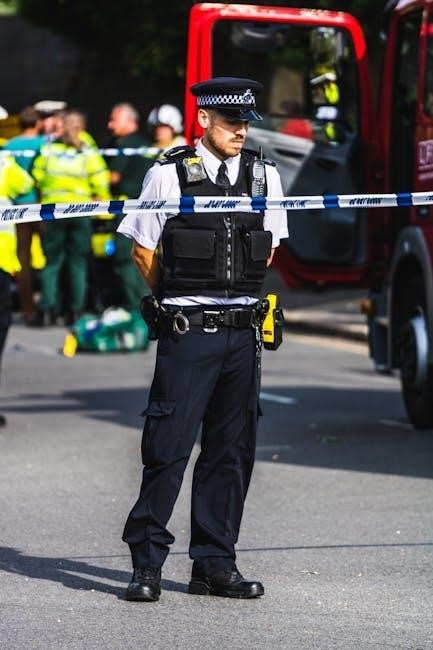
2․5 Responding to Emergencies
Security guards are trained to respond swiftly and effectively in emergency situations, ensuring the safety of people and property․ They must remain vigilant and prepared to handle incidents such as fires, medical emergencies, intrusions, or violent behavior․ Guards are often the first point of contact in crises, requiring them to assess situations quickly and take appropriate actions․ This includes securing the area, providing first aid if necessary, and coordinating with emergency services like police or firefighters․ Their role involves minimizing risks, preventing escalation, and ensuring compliance with safety protocols․ Guards must also document incidents and provide detailed reports for further investigation․ Effective emergency response requires strong communication skills, calm decision-making, and the ability to prioritize safety above all else․ By addressing emergencies promptly, security guards play a vital role in safeguarding lives and assets, demonstrating their critical importance in maintaining security and order․ Their actions often prevent minor issues from developing into major crises․
2․6 Communicating and Reporting Incidents
Effective communication and accurate reporting are essential responsibilities of a security guard․ They must clearly convey information during incidents, ensuring all parties understand the situation and necessary actions․ Guards are required to document incidents thoroughly, including dates, times, locations, and detailed descriptions of events․ Incident reports often include witness statements, suspect descriptions, and any actions taken to resolve the situation․ These reports are critical for investigations, legal proceedings, and improving security protocols․ Guards must also communicate with law enforcement, supervisors, and other stakeholders to ensure a coordinated response․ Their ability to articulate findings and maintain detailed records helps in addressing incidents effectively and preventing future occurrences․ Clear communication and precise reporting are vital skills for security personnel, enabling them to maintain accountability and contribute to a safer environment․ By providing comprehensive reports, guards play a key role in upholding justice and organizational security․ Their documentation serves as a valuable resource for decision-making and operational improvements․
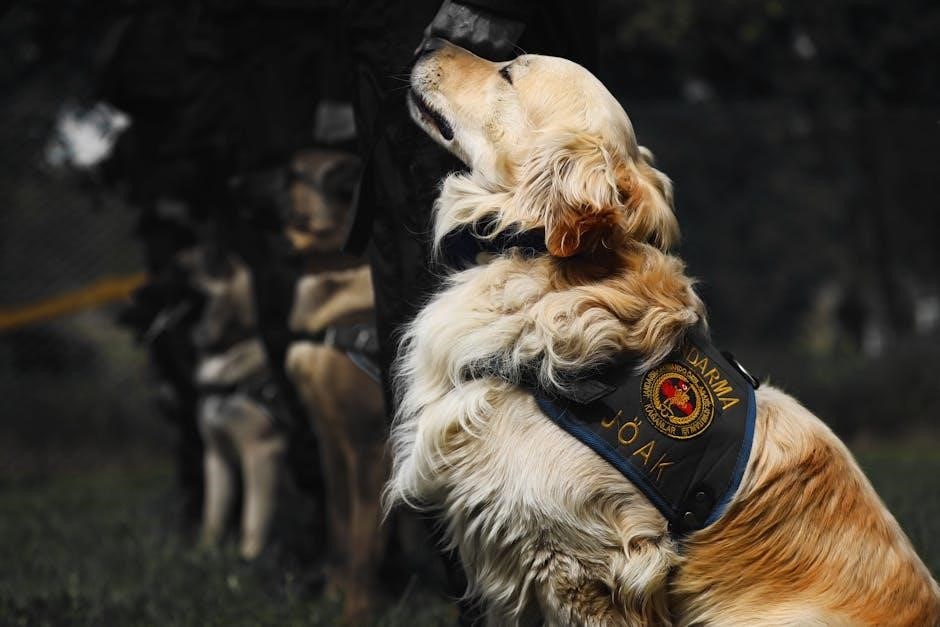
2․7 Ensuring Compliance with Laws and Regulations
Security guards must ensure compliance with all relevant laws, regulations, and organizational policies while performing their duties․ This includes understanding and adhering to legal standards related to arrest, detention, and search procedures․ Guards are expected to respect human rights during security actions and follow proper protocols when interacting with individuals․ They must also comply with health and safety regulations to maintain a secure environment․ Additionally, security personnel are responsible for staying informed about changes in laws and regulations that impact their role․ Compliance ensures that security actions are lawful, ethical, and aligned with organizational goals․ Guards must report any violations of laws or policies to their superiors and take steps to prevent non-compliance․ By upholding legal and regulatory standards, security guards contribute to a safe, just, and orderly environment for everyone․ Their adherence to these principles is critical for maintaining trust and accountability in their professional responsibilities․
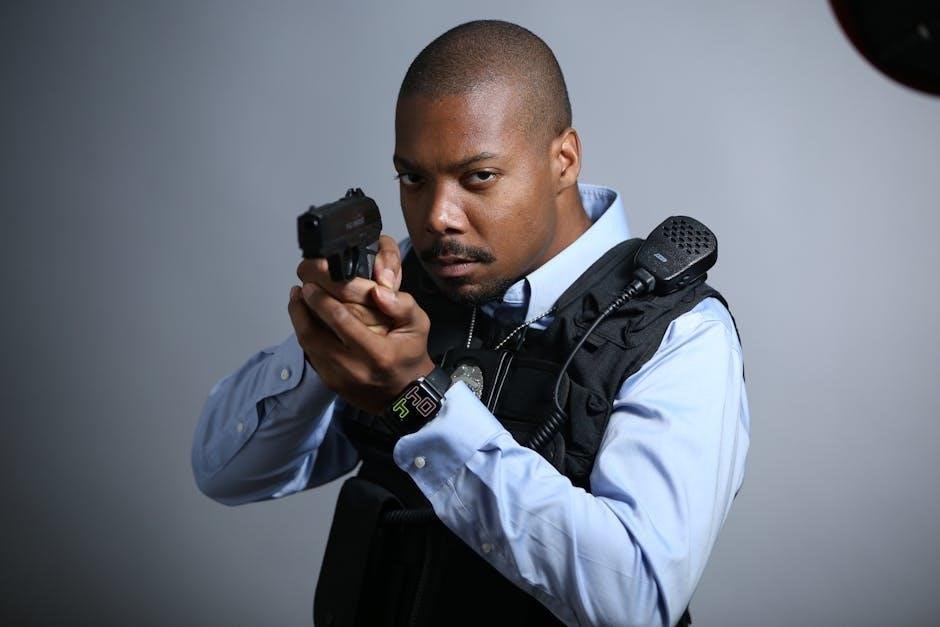
2․8 Collaborating with Law Enforcement and Teams
Security guards must collaborate effectively with law enforcement agencies and internal teams to ensure a coordinated response to security threats․ This collaboration involves sharing information, reporting incidents, and assisting law enforcement during investigations or emergencies․ Guards often serve as the first point of contact for law enforcement and must maintain open communication channels to ensure seamless cooperation․ They may also participate in joint security operations or training exercises to enhance overall security measures․ Additionally, security guards work closely with facility management, HR, and other departments to address safety concerns and implement security protocols․ By fostering strong partnerships, security personnel contribute to a safer and more efficient security framework․ Their ability to collaborate ensures that incidents are managed effectively and that legal and organizational standards are upheld․ This teamwork is essential for maintaining public trust and achieving shared security objectives․
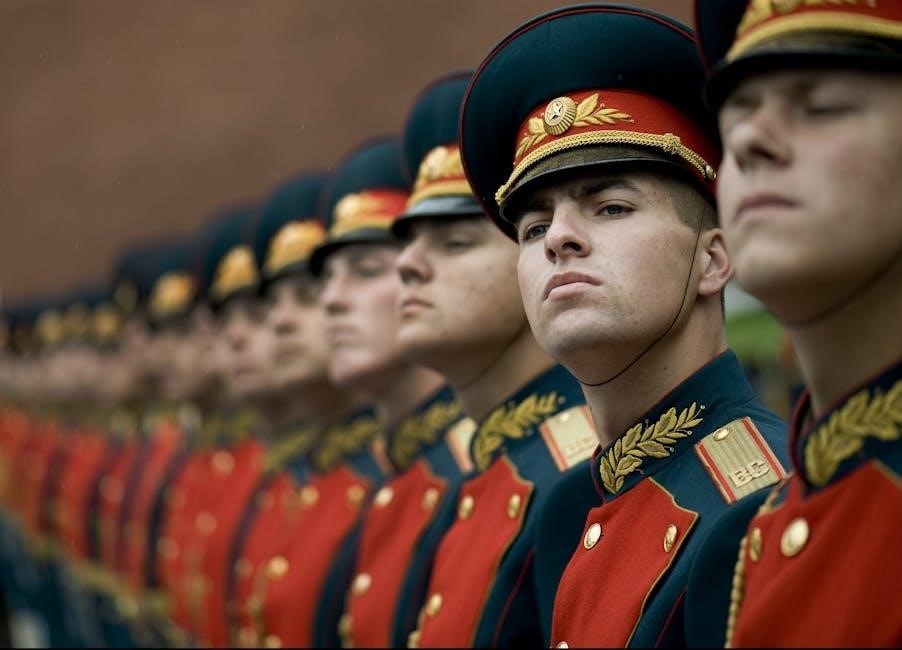
2․9 Interacting with the Public Professionally
2․10 Maintaining Records and Documentation
Maintaining accurate and detailed records is a vital responsibility of security guards․ They must document incidents, such as thefts, accidents, or unauthorized access, ensuring all details are captured thoroughly․ Guards are also required to complete incident reports, noting the time, location, and parties involved․ Additionally, they must log routine activities, including patrol rounds, equipment checks, and visitor entries․ Proper documentation helps in tracking patterns, investigating incidents, and providing evidence if needed․ Security guards must adhere to organizational protocols for record-keeping, ensuring data is stored securely and in compliance with regulations․ Accurate documentation not only aids in accountability but also supports legal proceedings and internal reviews․ By maintaining precise records, security personnel contribute to a transparent and efficient security management system, which is essential for safeguarding assets and ensuring operational continuity․ Effective record-keeping is a cornerstone of professional security practices, underscoring the importance of attention to detail and organizational skills․
